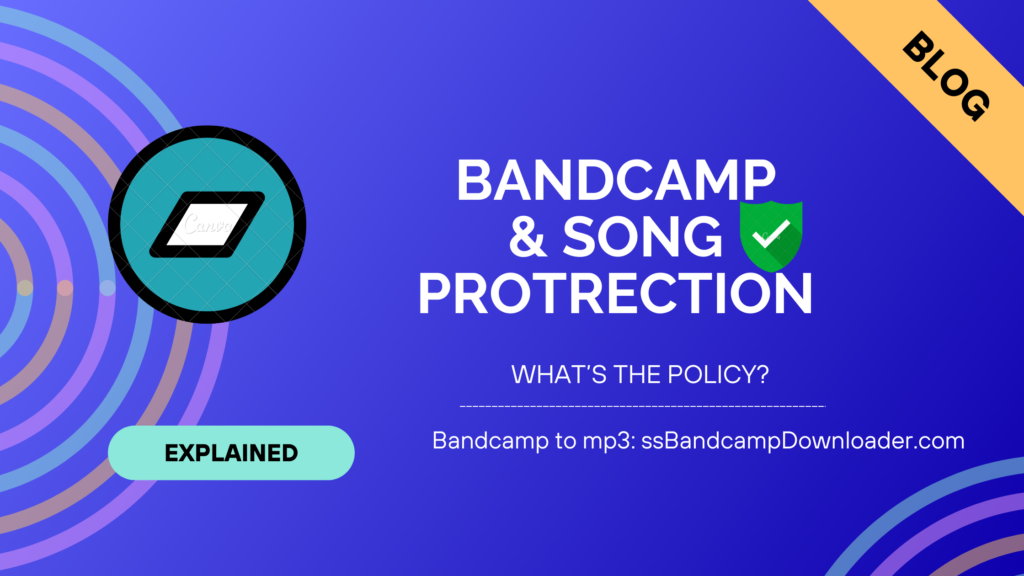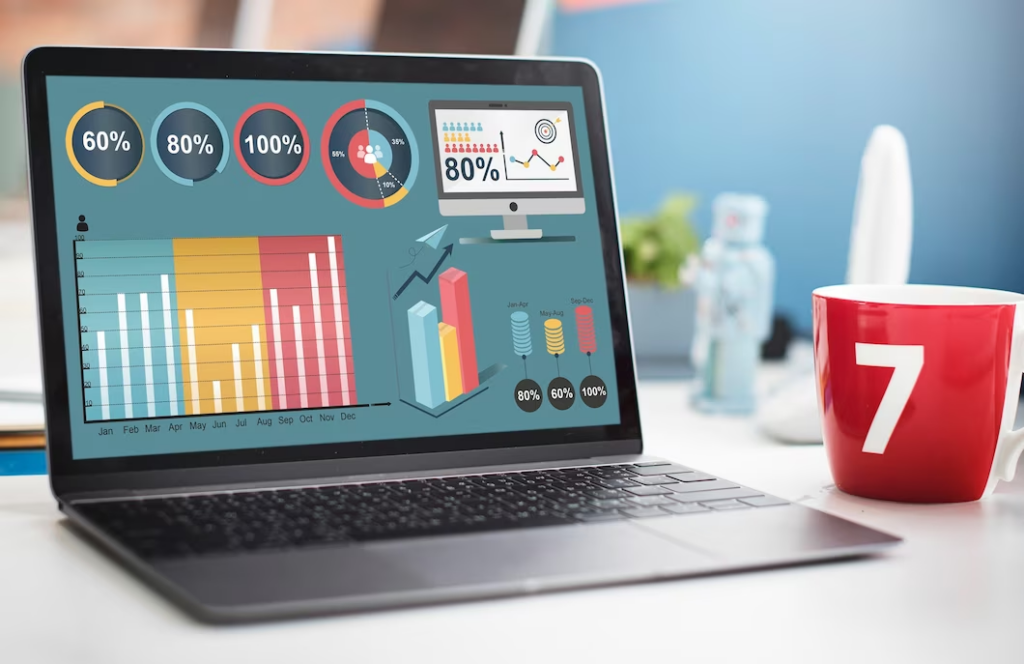In the digital age, Bandcamp has emerged as a pivotal platform for independent musicians, offering them a unique avenue to showcase and sell their music directly to fans. While this artist-friendly platform empowers musicians, it’s essential to understand the extent to which your songs are protected within its ecosystem.
This article delves into the intricacies of safeguarding your musical creations on Bandcamp, clarifying copyright principles, dissecting Bandcamp’s Terms of Service, and shedding light on licensing options.
By the end, you’ll be equipped with the knowledge needed to navigate the platform confidently. it will ensure that your musical endeavors remain secure and thriving.

Copyright Basics
Copyright is a fundamental concept for musicians, serving as the bedrock of legal protection for your creative works, including songs. Understanding copyright basics is crucial when it comes to safeguarding your music on Bandcamp.
In simple terms, copyright is a legal framework that grants exclusive rights to creators, such as musicians, over their original works. This means that when you compose a song, you automatically have copyright protection over it. You don’t need to register your work for it to be protected. It’s inherent from the moment of creation.
These exclusive rights typically include the right to reproduce, distribute, perform, and adapt your music. In the context of Bandcamp, this means you have control over how your songs are shared, sold, and used on the platform.
The importance of copyright extends to the prevention of unauthorized use or duplication of your music. This legal protection ensures that others cannot profit from your work without your permission. On Bandcamp, it translates to having control over the distribution and monetization of your songs, offering peace of mind to independent musicians.
Are My Songs Protected on Bandcamp?

Understanding Bandcamp’s Terms of Service is vital for any musician looking to protect their songs on the platform. These terms outline the rules and regulations governing the use of Bandcamp and have a direct impact on how the platform treats your music.
When you sign up as an artist on Bandcamp, you agree to abide by these terms. While it’s advisable to read the terms thoroughly, here’s a simplified breakdown of what you can expect:
- Rights Retained: Bandcamp’s terms typically specify that you, as the musician, retain ownership of your music. This means you have control over how your songs are distributed and used on the platform.
- Licenses: Bandcamp allows you to choose how you want to license your music. This can range from a traditional copyright to various Creative Commons licenses. Your choice affects how others can use your work, so it’s crucial to understand these options.
- Revenue Share: Bandcamp’s terms also cover revenue sharing. They explain how much of the money generated from sales and streams of your music will go to Bandcamp and how much you’ll receive. This transparency is vital for ensuring a fair compensation.
- Content Policy: The terms lay out the content policies for Bandcamp. Understanding these policies can help you avoid violations that could lead to your music being taken down.
- Dispute Resolution: In case of any disputes, Bandcamp’s terms typically outline how they will be resolved. This can include copyright infringement claims or issues related to payments.
- Termination: The terms specify the circumstances under which your account or music might be removed from the platform. Knowing these conditions can help you prevent such situations.
By comprehending Bandcamp’s Terms of Service, you’ll be well-informed about the rules governing your music on the platform. This knowledge is essential for ensuring that your songs remain protected and that you can navigate the platform confidently while maximizing its benefits for your musical career.
Uploading and Selling Music on Bandcamp

Uploading and selling music on Bandcamp is a straightforward process, but it’s essential to understand how it works to protect your songs effectively. Here’s a step-by-step guide:
- Create an Artist Account: If you haven’t already, you’ll need to sign up as an artist on Bandcamp. This involves providing necessary information about yourself and your music.
- Upload Your Music: Once you have an artist account, you can start uploading your songs. Bandcamp supports various audio file formats. You’ll need to provide details like the track title, album name, and genre. It’s essential to ensure all information is accurate and complete.
- Set a Price: You have control over how you want to price your music on Bandcamp. You can offer your songs for free, set a fixed price, or allow fans to name their price. This flexibility allows you to choose a pricing strategy that suits your goals.
- Choose the Release Date: You can specify when you want to release your music on Bandcamp. This can help with promotional planning.
- Preview Tracks: You can choose which tracks to make available for preview. This allows potential fans to listen to a snippet of your music before making a purchase decision.
- Customize Your Page: Bandcamp provides tools to customize your artist page. You can add artwork, write a bio, and provide links to your social media profiles. A well-designed page can enhance your brand and attract more fans.
- Promote Your Music: While Bandcamp provides a platform for selling music, it’s crucial to actively promote your work. Share your Bandcamp page on social media, collaborate with other artists, and engage with your fans.
- Monitor Sales and Analytics: Bandcamp offers insights into your sales and audience engagement. Regularly check these analytics to understand how your music is performing and make informed decisions.
- Digital Downloads and Streaming: Bandcamp allows fans to purchase and download your music as well as stream it. This flexibility caters to various consumer preferences.
By following these steps, you can effectively upload, sell, and promote your music on Bandcamp. Understanding the platform’s features and options is key to ensuring that your songs are protected while reaching your target audience.
Song Licensing and Permissions

Song licensing and permissions on Bandcamp play a significant role in how your music is protected and shared. Let’s explore this important aspect:
- Licensing Options: Bandcamp provides musicians with the flexibility to choose how they want to license their music. You can opt for traditional copyright, which grants you exclusive rights over your work, including the usage & distribution. Alternatively, you can utilize various Creative Commons licenses, allowing you to define specific terms for sharing and reuse of your music.
- Copyright Implications: If you opt for traditional copyright, it’s essential to understand that you retain full control over your songs. This means others cannot use your music without your permission, which provides robust protection for your creative work.
- Creative Commons Licenses: If you choose to use Creative Commons licenses, you’re granting certain permissions to others, such as allowing them to use your music for non-commercial purposes or to create derivative works. These licenses offer a way to share your music more freely while specifying the terms of use.
- Licensing Your Way: By offering different licensing options, Bandcamp empowers you to tailor your approach to match your artistic goals and values. Whether you want to maximize exposure or maintain strict control, understanding the implications of each choice is crucial.
- Public Domain and All Rights Reserved: Bandcamp also allows you to designate your music as “Public Domain” or “All Rights Reserved.” Public Domain means you’re relinquishing all rights, allowing anyone to use your music without restrictions. “All Rights Reserved” signifies that you’re retaining full control and not granting any permissions.
- License Transparency: Clearly communicate your chosen licensing terms on your Bandcamp page. This ensures that fans and potential collaborators understand how they can use your music, reducing the risk of misunderstandings or unauthorized use.
In summary, Bandcamp’s song licensing and permissions system gives you the power to define how fans use & share your music. Whether you opt for traditional copyright or explore Creative Commons licenses, being aware of the implications of your choices is essential for ensuring that your songs are protected while reaching your desired audience.
Dealing with Copyright Infringement
Dealing with copyright infringement is a critical aspect of protecting your songs on Bandcamp. Here’s how to navigate this issue:
- Monitoring Your Music: Regularly monitor your music on Bandcamp to detect any unauthorized use or infringement. This can involve searching for copies of your songs or suspicious activity related to your music.
- Reporting Copyright Infringement: If you discover that someone is using your music without permission on Bandcamp, you can report it to the platform. Bandcamp has mechanisms in place to address copyright violations. These reports typically require you to provide evidence of your ownership, such as copyright registration or proof of creation.
- Bandcamp’s Role: Bandcamp takes copyright infringement seriously. When you report a violation, the platform will investigate and take appropriate action, which may include removing the infringing content.
- Cease and Desist: In some cases, you might need to send a cease and desist letter to the infringing party. This legal document formally requests them to stop using your music without permission.
- Legal Action: If necessary, you can pursue legal action against copyright infringers. Consult with legal professionals who specialize in intellectual property rights to explore your options.
- Preventing Infringement: To proactively prevent copyright infringement, consider adding watermarks to your music or releasing it in a way that makes unauthorized use more difficult.
- Educate Your Fans: Educate your fans and followers about the importance of respecting copyright and obtaining proper licenses for music use. This can help create a supportive community that values your work and respects your rights.
- Register Your Copyright: While copyright is automatic upon creation, registering your music with the relevant copyright authorities provides additional legal protection and makes it easier to enforce your rights in case of infringement.
Data and Analytics

Data and analytics are valuable tools on Bandcamp that can aid in protecting your songs and understanding your audience better. Here’s how to make the most of them:
- Accessing Analytics: Bandcamp offers artists access to detailed analytics about their music’s performance. This includes information about how many times your songs are streamed or downloaded, where your listeners are located, and which tracks are the most popular.
- Understanding Your Audience: Analytics can provide insights into your audience’s demographics and preferences. This information helps you tailor your music and marketing strategies to better connect with your fan base.
- Monitoring Usage: Analyze how people are using & sharing your songs. If you notice any unusual patterns or spikes in usage, it may indicate potential copyright issues or unauthorized distribution.
- Spotting Trends: Use analytics to identify trends in your music’s popularity. This can inform your decisions regarding which songs to promote, when to release new music, and how to engage with your audience effectively.
- Optimizing Sales and Promotions: Data on sales and revenue can help you fine-tune your pricing strategies and promotional efforts. For example, you can experiment with limited-time discounts based on which tracks are trending.
- Privacy and Security: Be mindful of the privacy and security of your data. Ensure that any third-party analytics tools you use comply with Bandcamp’s terms and safeguard your sensitive information.
- Feedback Loop: Pay attention to fan comments and feedback on your Bandcamp page. These comments can provide valuable insights into what your audience appreciates or suggests areas for improvement.
- Data-Driven Decision-Making: Use analytics to inform your decisions about your musical career. Whether it’s planning tours, selecting songs for a new album, or deciding which platforms to focus on, data-driven choices can lead to better outcomes.
In summary, data and analytics on Bandcamp empower you to make informed decisions about your music and its protection. By regularly monitoring and interpreting this data, you can optimize your music’s performance, better engage with your audience, and safeguard your creative work effectively.
Case Studies
Case studies provide real-world examples of how musicians have encountered and addressed copyright challenges on Bandcamp. Here are some illustrative scenarios:
- Unauthorized Sampling: In this case, an artist discovered that another musician had sampled their music without permission and released it as their own on Bandcamp. The affected artist reported the infringement to Bandcamp, providing evidence of their original work. As a result, Bandcamp took down the infringing material, upholding the rights of the original creator.
- Misuse of Licensing: A musician decided to license their music under a Creative Commons Attribution-NonCommercial license on Bandcamp. However, someone used their music for a commercial project without proper attribution. The artist reported the violation, and Bandcamp acted by sending a takedown notice to the infringing party and clarifying the licensing terms.
- Counterfeit Merchandise: A band found that unauthorized merchandise with their logo and album art was being sold on Bandcamp by a third party. The band filed a complaint with Bandcamp, who promptly removed the counterfeit listings, protecting the band’s brand and revenue.
- Cover Song Dispute: A Bandcamp artist recorded a cover version of a well-known song and released it on the platform. The original copyright holder claimed the cover was a copyright violation. Bandcamp investigated the dispute, and the cover was either removed or the necessary licensing agreement was established.
- Fan-Uploaded Content: Sometimes, fans may upload live recordings or unofficial remixes of an artist’s songs without permission. When brought to their attention, Bandcamp can assist in removing these unauthorized fan uploads.
These case studies exemplify various copyright and protection issues musicians may encounter on Bandcamp. The platform’s mechanisms and policies are designed to address such challenges and ensure that artists can have control over their work while respecting the rights of others. By being aware of these real-world examples, musicians can better navigate potential copyright issues and protect their songs effectively.
Alternatives and Additional Protection Measures
Exploring alternatives and additional protection measures beyond Bandcamp can provide musicians with a more comprehensive strategy for safeguarding their songs:
- Diversifying Platforms: While Bandcamp is an excellent platform for independent musicians, it’s wise to diversify your online presence. Consider distributing your music on other platforms like Spotify, Apple Music, Amazon Music, and SoundCloud. Each platform has its unique benefits and audience.
- Registering Your Copyright: Although copyright is automatic upon creation, registering your songs with your country’s copyright office adds an extra layer of protection. It provides a legal record of your ownership, making it easier to enforce your rights if necessary.
- Music Licensing Agencies: Joining a music licensing agency or organization can help protect your songs and generate additional revenue. These agencies handle licensing, collect royalties, and monitor your music’s usage in various media like films, TV shows, and commercials.
- Watermarking: Consider watermarking your music before uploading it to Bandcamp. Watermarks can deter unauthorized use by protect your music, and it can help trace the source if infringement occurs.
- Legal Consultation: Consult with a legal expert who specializes in intellectual property rights, especially if your music is a significant part of your income or brand. They can advise you on the best strategies for protecting your songs and taking legal action if needed.
- Fan Engagement: Build strong relationships with your fans and engage with them on social media and through your Bandcamp page. A supportive fan base can help spot and report unauthorized use of your music, acting as an additional layer of protection.
- Stay Informed: Keep up-to-date with changes in copyright laws and digital music distribution. Being informed about industry trends and legal developments can help you adapt your protection measures accordingly.
- Cybersecurity: Protect your digital music files and data. Use strong, unique passwords, consider encrypting your music files, and regularly back up your work to prevent unauthorized access or data loss.
By exploring these alternatives and additional protection measures, musicians can create a more comprehensive strategy to safeguard their songs in an ever-evolving digital landscape. While Bandcamp provides valuable tools, a multi-faceted approach can enhance protection and ensure that your music remains secure and profitable.
Conclusion
In conclusion, protecting your songs on Bandcamp is essential for every independent musician. By understanding copyright principles, Bandcamp’s Terms of Service, and licensing options, you can navigate the platform confidently.
Uploading your music, utilizing data and analytics, and learning from real-world case studies enhance your ability to safeguard your creative work effectively.
Moreover, considering alternatives and additional protection measures beyond Bandcamp ensures a comprehensive strategy. Remember, as a musician, your songs are not only your art but also your livelihood.
With the right knowledge and proactive approach, you can harness the power of Bandcamp while preserving the integrity and value of your music in the digital era.
FAQs
No, copyright protection is automatic upon creation. However, registering your songs with copyright authorities provides additional legal benefits, making it easier to enforce your rights in case of infringement.
Yes, Bandcamp allows you to offer your songs for free or let fans name their price. This flexibility allows you to reach a wider audience and build a fan base, even if you choose not to charge for your music.
Report the copyright infringement to Bandcamp. They have mechanisms in place to investigate and take appropriate action, such as removing the infringing content.
Utilize Bandcamp’s data and analytics tools, which provide insights into your music’s performance, audience demographics, and more. Regularly reviewing these analytics can help you track usage and trends.
Diversifying your music distribution across multiple platforms can increase your reach. Consider platforms like Spotify, Apple Music, Amazon Music, and SoundCloud, depending on your goals and target audience.
